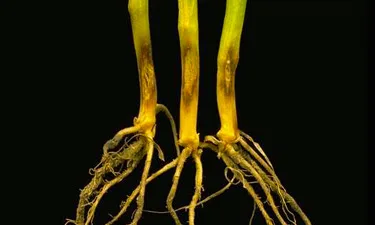
True Eyespot
True Eyespot
What is True Eyespot?
Eyespot is widespread in the UK, but more prevalent in the wetter west and the north of England. True eyespot survives up to three years on infected stubble, as well as on volunteers and grass weeds (Elymus repens). It is mostly dispersed by rain splash conidia (vegetative phase), but ascospores from apothecia on standing stubble are also an infection source. Ascospores can travel long distances by wind.
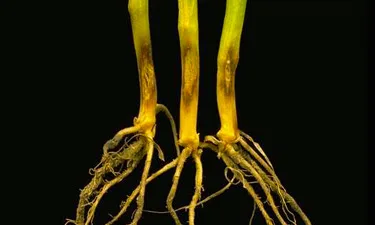
Typical true eyespot symptoms
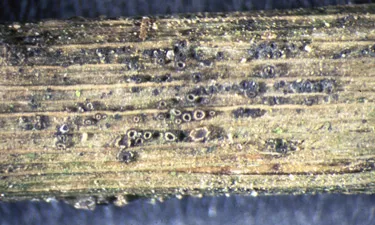
Apothcia on stubble
The ideal growth temperature for true eyespot is between 5-13°C, growth is inhibited above 16°C. Free water is essential for infection and the disease is favoured by wet soils and high nitrogen. Under optimum conditions, true eyespot can complete its vegetative life cycle in 15 days, but it can take up to eight weeks for infection to pass through the leaf sheaths to the stem. The sexual stage, whereby apothecia are produced in standing stubble towards the end of the season, can take several weeks.
How to recognise symptoms
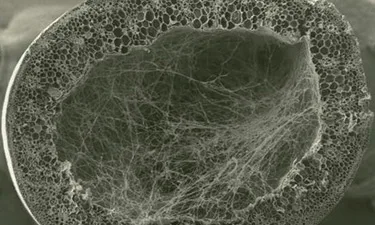
Mycelium inside a stem
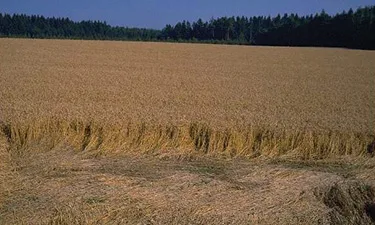
Lodging from severe eyespot
Symptoms are notoriously difficult to assess, especially early season R-type infections. This species can progress through basal leaf sheaths without much visible footprint, but still impedes nutrient and water flow.
The W-type tends to form visible lesions earlier in the season, although these are often less damaging. Lesions are dark brown bordered and lens-shaped, with a pale brown centre with small black pinhead clusters (the compound appressoria or infection structures). The latter can often be seen on successive leaf sheaths in early seasons, in the absence of visible browning.
R-type infections can be very aggressive, and the disease progresses through successive leaf sheaths with much less of a visible lesion than the W-type. This can lead to misleading interpretation of fungicide activity, if visual assessments are not combined with yield data.
Whilst eyespot lesions seeded from rain-splashed vegetative spores (conidia) are placed close to the base of the plant, those arising later in the season from airborne sexual spores (ascospores) can be much higher up the stem.
What impact does true eyespot have on yield?
Yield reductions average about 5%, but in severe infections, losses can be as high as 40%. These losses are due to impeded nutrient flow to the roots and water and nitrogen to the leaves later in the season. This leads to stunting, poor root systems with associated low drought tolerance, and whitehead formation. This can be further compounded by crop lodging, as basal lesions cause stem breakage.
Effective management of true eyespot
True eyespot is generally present as a complex of diseases at the stem base, much like the ear blight disease complex. These include sharp eyespot, true Fusarium species and Microdochium species. Its important to use fungicides with activity on all these species, as levels of one can increase if another is selectively controlled or suppressed.
Effective suppression of true eyespot can be achieved even if it is already established at the time of fungicide application. This suppressive activity prevents further development, leaf sheath penetration and stem infection, thus minimising yield losses.
True eyespot suppression is best achieved with a prothiocoanzole-based treatment at T1 containing at least 150g prothioconazole/ha. Products that deliver the optimum amount of active ingredient include 0.55L/ha Proline275 or 1L/ha of Aviator235Xpro.
As well as excellent activity on W- and R-types, this rate of prothioconazole has the additional advantages of having the broadest spectrum activity on all other stem base diseases (see foot rot section) , as well as all important T1 foliar diseases including Septoria, rusts and mildew.


